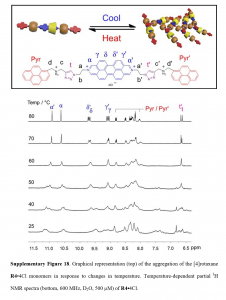 Nuclear Magnetic Resonance (NMR) is a method that exploits the magnetic properties of certain atomic nuclei and determines the physical and chemical properties of atoms or the molecules in which they are contained. Since compounds and materials are composed of all kinds of elements, many of them are NMR active and can be easily detected with NMR. Often times, researchers want to see how their samples change when different temperatures are applied, from as high as 150 Celsius to as low as -150 Celsius. The Bruker Avance III 600 MHz Nuclear Magnetic Resonance (NMR) system is primarily used for variable temperature and heteronuclear experiments for polymer, supramolecular assembly, and other novel materials.
Nuclear Magnetic Resonance (NMR) is a method that exploits the magnetic properties of certain atomic nuclei and determines the physical and chemical properties of atoms or the molecules in which they are contained. Since compounds and materials are composed of all kinds of elements, many of them are NMR active and can be easily detected with NMR. Often times, researchers want to see how their samples change when different temperatures are applied, from as high as 150 Celsius to as low as -150 Celsius. The Bruker Avance III 600 MHz Nuclear Magnetic Resonance (NMR) system is primarily used for variable temperature and heteronuclear experiments for polymer, supramolecular assembly, and other novel materials.
Some examples are Fluorine 19 and Phosphorous 31, which are common among drug compounds and biologically important nucleic acids. Another important experiment is diffusion-ordered spectroscopy (DOSY) which differentiates the NMR signals of different species based on their diffusion coefficients.
As with many instruments in the SHyNE facilities, the Bruker Avance III draws many external and internal users to perform nanoscale research.
 Professor Scott Denmark, from the University of Illinois Urbana Champaign, used the Bruker Avance for low-temperature rapid injection nuclear magnetic resonance spectroscopy to significantly improve the understanding of Palladium-catalyzed coupling reactions.
Professor Scott Denmark, from the University of Illinois Urbana Champaign, used the Bruker Avance for low-temperature rapid injection nuclear magnetic resonance spectroscopy to significantly improve the understanding of Palladium-catalyzed coupling reactions.- Sir Frasier Stoddart, from Northwestern University, using tunable solid-state fluorescent materials to help fluorescent security ink be easier to verify and harder for hackers to decode or counterfeit.
- Professor Tobin Marks, from Northwestern University, has used the system to help make catalysts through olefin polymerization which has helped Dow Chemical produce over 30 billion kg of advanced polyolefins.
 Dr. Yongbo Zhang is a Research Assistant Professor and a Facility Manager for Northwestern University’s Integrated Molecular Structure Education and Research Center (IMSERC). By training, Zhang is a chemist with focus on structural biology NMR spectroscopy, which he has used to characterize nano material. As a facility manager, Zhang trains new users, provides technical assistance for users, develops and implements new experiments to meet users’ demands, and maintains optimal operating conditions for instruments. Zhang has been with Northwestern for 13 years total, spending eight years as the facility manager of the Biological NMR center before he became part of IMSERC, where he has spent the last five. When he is not working in IMSERC, Yongbo enjoys reading, traveling, and biking.
Dr. Yongbo Zhang is a Research Assistant Professor and a Facility Manager for Northwestern University’s Integrated Molecular Structure Education and Research Center (IMSERC). By training, Zhang is a chemist with focus on structural biology NMR spectroscopy, which he has used to characterize nano material. As a facility manager, Zhang trains new users, provides technical assistance for users, develops and implements new experiments to meet users’ demands, and maintains optimal operating conditions for instruments. Zhang has been with Northwestern for 13 years total, spending eight years as the facility manager of the Biological NMR center before he became part of IMSERC, where he has spent the last five. When he is not working in IMSERC, Yongbo enjoys reading, traveling, and biking.
If you are interested in using the Bruker Avance III 600 MHz system – STS LpX Pegasus, please contact Ben Myers at shyne@northwestern.edu or (847) 467-1081.